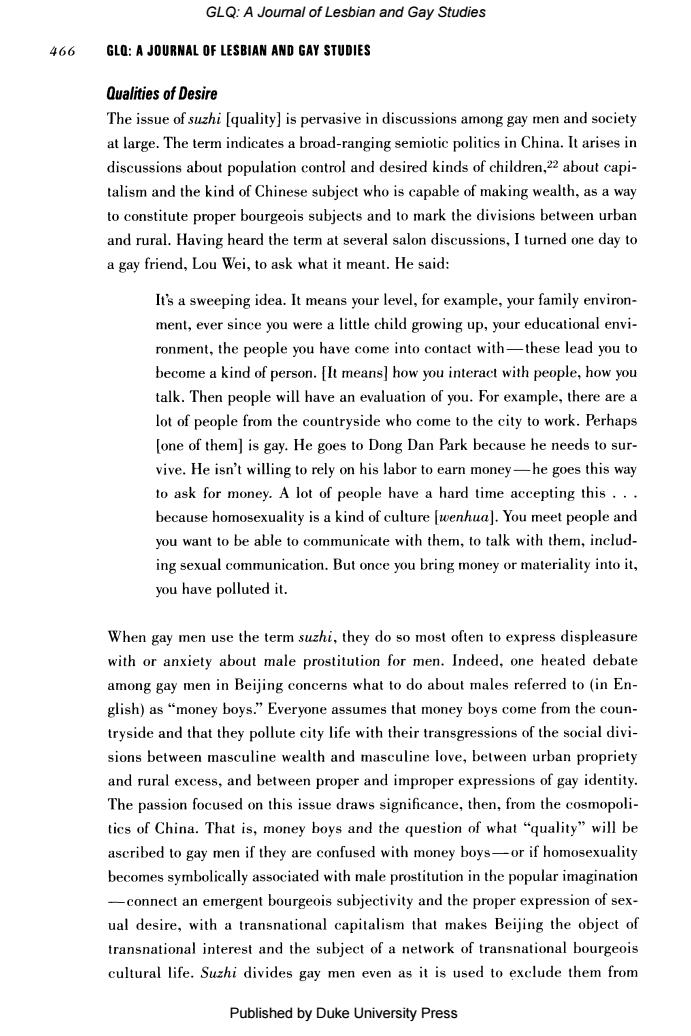正在加载图片...

GLQ:A Joumal of Lesbian and Gay Studies 466 GLQ:A JOURNAL OF LESBIAN AND GAY STUDIES Qualities of Desire The issue of suzhi [quality]is pervasive in discussions among gay men and society at large.The term indicates a broad-ranging semiotic politics in China.It arises in discussions about population control and desired kinds of children,22 about capi- talism and the kind of Chinese subject who is capable of making wealth,as a way to constitute proper bourgeois subjects and to mark the divisions between urban and rural.Having heard the term at several salon discussions,I turned one day to a gay friend,Lou Wei,to ask what it meant.He said: It's a sweeping idea.It means your level,for example,your family environ- ment,ever since you were a little child growing up,your educational envi- ronment,the people you have come into contact with-these lead you to become a kind of person.[It means]how you interact with people,how you talk.Then people will have an evaluation of you.For example,there are a lot of people from the countryside who come to the city to work.Perhaps [one of them]is gay.He goes to Dong Dan Park because he needs to sur- vive.He isn't willing to rely on his labor to earn money-he goes this way to ask for money.A lot of people have a hard time accepting this... because homosexuality is a kind of culture [wenhual.You meet people and you want to be able to communicate with them,to talk with them,includ- ing sexual communication.But once you bring money or materiality into it, you have polluted it. When gay men use the term suzhi,they do so most often to express displeasure with or anxiety about male prostitution for men.Indeed,one heated debate among gay men in Beijing concerns what to do about males referred to(in En- glish)as"money boys."Everyone assumes that money boys come from the coun- tryside and that they pollute city life with their transgressions of the social divi- sions between masculine wealth and masculine love,between urban propriety and rural excess,and between proper and improper expressions of gay identity. The passion focused on this issue draws significance,then,from the cosmopoli- tics of China.That is,money boys and the question of what"quality"will be ascribed to gay men if they are confused with money boys-or if homosexuality becomes symbolically associated with male prostitution in the popular imagination -connect an emergent bourgeois subjectivity and the proper expression of sex- ual desire,with a transnational capitalism that makes Beijing the object of transnational interest and the subject of a network of transnational bourgeois cultural life.Suzhi divides gay men even as it is used to exclude them from Published by Duke University Press466 GLQ: A JOURNAL OF LESBIAN AND GAY STUDIES Qualities of Desire The issue of suhi [quality] is pervasive in discussions among gay men and society at large. The term indicates a broad-ranging semiotic politics in China. It arises in discussions about population control and desired kinds of children,22 about capitalism and the kind of Chinese subject who is capable of making wealth, as a way to constitute proper bourgeois subjects and to mark the divisions between urban and rural. Having heard the term at several salon discussions, I turned one day to a gay friend, Lou Wei, to ask what it meant. He said: It’s a sweeping idea. It means your level, for example, your family environment, ever since you were a little child growing up, your educational environment, the people you have come into contact with-these lead you to become a kind of person. [It means] how you interact with people, how you talk. Then people will have an evaluation of you. For example, there are a lot of people from the countryside who come to the city to work. Perhaps [one of them] is gay. He goes to Dong Dan Park because he needs to survive. He isn’t willing to rely on his labor to earn money-he goes this way to ask for money. A lot of people have a hard time accepting this . . . because homosexuality is a kind of culture [wenhua]. You meet people and you want to be able to communicate with them, to talk with them, including sexual communication. But once you bring money or materiality into it, you have polluted it. When gay men use the term suthi, they do so most often to express displeasure with or anxiety about male prostitution for men. Indeed, one heated debate among gay men in Beijing concerns what to do about males referred to (in English) as “money boys.” Everyone assumes that money boys come from the countryside and that they pollute city life with their transgressions of the social divisions between masculine wealth and masculine love, between urban propriety and rural excess, and between proper and improper expressions of gay identity. The passion focused on this issue draws significance, then, from the cosmopolitics of China. That is, money boys and the question of what “quality” will be ascribed to gay men if they are confused with money boys-or if homosexuality becomes symbolically associated with male prostitution in the popular imagination -connect an emergent bourgeois subjectivity and the proper expression of sexual desire, with a transnational capitalism that makes Beijing the object of transnational interest and the subject of a network of transnational bourgeois cultural life. Suthi divides gay men even as it is used to exclude them from GLQ: A Journal of Lesbian and Gay Studies Published by Duke University Press